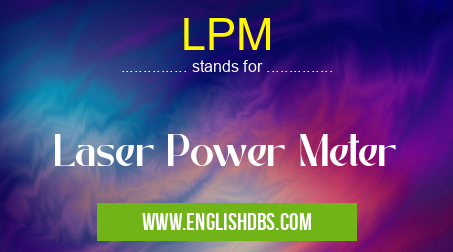What does LPM mean in ELECTRONICS
A laser power meter, or LPM, is a device used to measure the intensity of a laser beam. It is used for measuring high-power lasers in industrial applications and for measuring lower-powered lasers in research labs. The laser power meter is an essential tool for many fields such as medicine, industrial manufacturing, research and development, and other scientific fields.

LPM meaning in Electronics in Academic & Science
LPM mostly used in an acronym Electronics in Category Academic & Science that means Laser Power Meter
Shorthand: LPM,
Full Form: Laser Power Meter
For more information of "Laser Power Meter", see the section below.
Essential Questions and Answers on Laser Power Meter in "SCIENCE»ELECTRONICS"
What is a Laser Power Meter?
A Laser Power Meter is an instrument used to measure the power of a laser beam. It measures average power and peak power, usually in mW or Watts, which is important when setting up, adjusting and maintaining a laser system.
What are the features of a Laser Power Meter?
A Laser Power Meter typically has three key features: accuracy, resolution and dynamic range. Accuracy refers to how close it measures to the real value. Resolution is about how small changes in power can be detected and measured, while dynamic range tells you the smallest to largest powers that can be measured by one device.
How does a Laser Power Meter work?
A Laser Power Meter works by measuring the intensity of light using either an optical detector or photodiode. The power meter then converts this energy into an electrical signal with units ranging from microwatts (uW) to watts (W).
What are the applications of a Laser Power Meter?
A Laser Power Meter is commonly used for industrial applications such as controlling laser beam intensity for cutting and welding operations; laser engraving; medical laser treatments; and testing optical communications systems. They are also useful for research applications such as spectroscopy and LIDAR data collection.
Are all Laser Power Meters accurate?
Not all Laser Power Meters are equally accurate. To ensure accuracy, factors like temperature stability, wavelength sensitivity, spectral response bandwidth, calibration type and repeatability should be evaluated before purchasing or using any device.
How do I select a suitable Laser Power Meter for my application?
When selecting a suitable power meter for your application, you need to consider your budget constraints as well as the performance requirements of your application such as wavelength sensitivity and dynamic range needs. Additionally, determine whether you need single-wavelength or multi-wavelength functionality before selecting a suitable model.
Are there different types of optical detectors used in Laser Power Meters?
Yes — Different types of precision optical detectors are available depending on your application needs — thermal sensors detect average power whereas fast photo diodes detect peak powers accurately. Some models also include silicon photodiodes which have wide spectral responses.
Final Words:
In conclusion, a Laser Power Meter (LPM) is an essential tool for anyone who needs accurate readings on laser beam intensity when performing operations involving lasers -whether they are industrial or experimental in nature. With its ability to accurately measure output levels while providing data analysis functions via external connections, it has become an indispensable tool in many areas such as medical research, industrial manufacturing and scientific exploration.
